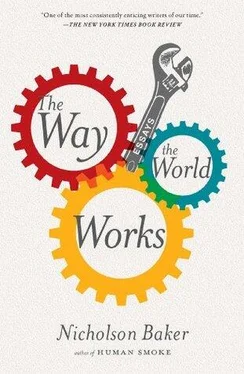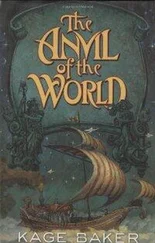Nicholson Baker - The Way the World Works
Здесь есть возможность читать онлайн «Nicholson Baker - The Way the World Works» весь текст электронной книги совершенно бесплатно (целиком полную версию без сокращений). В некоторых случаях можно слушать аудио, скачать через торрент в формате fb2 и присутствует краткое содержание. Год выпуска: 2012, Издательство: Simon & Schuster, Жанр: Публицистика, Критика, на английском языке. Описание произведения, (предисловие) а так же отзывы посетителей доступны на портале библиотеки ЛибКат.
- Название:The Way the World Works
- Автор:
- Издательство:Simon & Schuster
- Жанр:
- Год:2012
- ISBN:нет данных
- Рейтинг книги:4 / 5. Голосов: 1
-
Избранное:Добавить в избранное
- Отзывы:
-
Ваша оценка:
- 80
- 1
- 2
- 3
- 4
- 5
The Way the World Works: краткое содержание, описание и аннотация
Предлагаем к чтению аннотацию, описание, краткое содержание или предисловие (зависит от того, что написал сам автор книги «The Way the World Works»). Если вы не нашли необходимую информацию о книге — напишите в комментариях, мы постараемся отыскать её.
), here assembles his best short pieces from the last fifteen years.
The Way the World Works
OED
Modern Warfare 2
Through all these pieces, many written for
, and
, Baker shines the light of an inexpugnable curiosity.
is a keen-minded, generous-spirited compendium by a modern American master.
The Way the World Works — читать онлайн бесплатно полную книгу (весь текст) целиком
Ниже представлен текст книги, разбитый по страницам. Система сохранения места последней прочитанной страницы, позволяет с удобством читать онлайн бесплатно книгу «The Way the World Works», без необходимости каждый раз заново искать на чём Вы остановились. Поставьте закладку, и сможете в любой момент перейти на страницу, на которой закончили чтение.
Интервал:
Закладка:
But that came later. First it was just fun. One anonymous contributor wrote, of that early time:
I adored the Wikipedia when it was first launched and I contributed to a number of articles, some extensively, and always anonymously. The Wikipedia then was a riot of contributors, each adding bits and pieces to the articles they were familiar with, with nary an admin or editor in sight.
It worked and grew because it tapped into the heretofore unmarshaled energies of the uncredentialed. The thesis procrastinators, the history buffs, the passionate fans of the alternate universes of Garth Nix, Robotech, Half-Life, P. G. Wodehouse, Battlestar Galactica, Buffy the Vampire Slayer, Charles Dickens, or Ultraman — all those people who hoped that their years of collecting comics or reading novels or staring at TV screens hadn’t been a waste of time — would pour the fruits of their brains into Wikipedia, because Wikipedia added up to something. This wasn’t like writing reviews on Amazon, where you were just one of a million people urging a tiny opinion and a Listmania list onto the world — this was an effort to build something that made sense apart from one’s own opinion, something that helped the whole human cause roll forward.
Wikipedia was the point of convergence for the self-taught and the expensively educated. The cranks had to consort with the mainstreamers and hash it all out — and nobody knew who really knew what he or she was talking about, because everyone’s identity was hidden behind a jokey username. All everyone knew was that the end product had to make legible sense and sound encyclopedic. It had to be a little flat — a little generic — fair-minded — compressed — unpromotional — neutral. The need for the outcome of all edits to fit together as readable, unemotional sentences muted — to some extent — natural antagonisms. So there was this exhilarating sense of mission — of proving the greatness of the Internet through an unheard-of collaboration. Very smart people dropped other pursuits and spent days and weeks and sometimes years of their lives doing “stub dumps,” writing ancillary software, categorizing and linking topics, making and remaking and smoothing out articles — without getting any recognition except for the occasional congratulatory barnstar on their user page and the satisfaction of secret fame. Wikipedia flourished partly because it was a shrine to altruism — a place for shy, learned people to deposit their trawls.
But it also became great because it had a head start: from the beginning the project absorbed articles from the celebrated 1911 edition of the Encyclopedia Britannica, which is in the public domain. And not only the 1911 Britannica. Also absorbed were Smith’s Dictionary of Greek and Roman Biography, Nuttall’s 1906 Encyclopedia, Chambers’s Cyclopedia, Aiken’s General Biography, Rose’s Biographical Dictionary, Easton’s Bible Dictionary, and many others. In August 2001, a group of articles from W. W. Rouse Ball’s Short Account of the History of Mathematics —posted on the Net by a professor from Trinity College, Dublin — was noticed by an early Wikipedian, who wrote to his co-volunteers: “Are they fair game to grab as source material for our wikipedia? I know we are scarfing stuff from the 1911 encyclopedia, this is from 1908, so it should be under the same lack of restrictions. . ” It was. Rouse Ball wrote that Pierre Varignon was an intimate friend of Newton, Leibniz, and the Bernoullis and, after l’Hopital, was the earliest and most powerful advocate in France of the use of differential calculus. In January 2006, Wikipedia imported this 1908 article, with an insertion and a few modernizing rewordings, and it now reads:
Varignon was a friend of Newton, Leibniz, and the Bernoulli family. Varignon’s principal contributions were to graphic statics and mechanics. Except for l’Hôpital, Varignon was the earliest and strongest French advocate of differential calculus.
But the article is now three times longer, barnacled with interesting additions, and includes a link to another article discussing Varignon’s mechanical theory of gravitation.
The steady influx of top-hat-and-spatted sources elevated Wikipedia’s tone. This wasn’t just a school encyclopedia, a back-yard Encarta —this was drinks at the faculty club. You looked up Diogenes, and bang, you got something wondrously finished-sounding from the 1911 Britannica . That became Diogenes’ point of departure. And then all kinds of changes happened to the Greek philosopher, over many months and hundreds of revisions — odd theories, prose about the habits of dogs, rewordings, corrections of corrections. Now in Wikipedia there is this summary of Diogenes’ provocations:
Diogenes is said to have eaten (and, once, masturbated) in the marketplace, urinated on some people who insulted him, defecated in the theatre, and pointed at people with his middle finger.
And yet amid the modern aggregate, some curvy prose from the 1911 Britannica still survives verbatim:
Both in ancient and in modern times, his personality has appealed strongly to sculptors and to painters.
The fragments from original sources persist like those stony bits of classical buildings incorporated in a medieval wall.
But the sources and the altruism don’t fully explain why Wikipedia became such a boomtown. The real reason it grew so fast was noticed by cofounder Jimmy “Jimbo” Wales in its first year of life. “The main thing about Wikipedia is that it is fun and addictive,” Wales wrote. Addictive, yes. All big Internet successes — e-mail, AOL chat, Facebook, Gawker, Second Life, YouTube, Daily Kos, World of Warcraft —have a more or less addictive component — they hook you because they are solitary ways to be social: you keep checking in, peeking in, as you would to some noisy party going on downstairs in a house while you’re trying to sleep.
Brion Vibber, who was for a while Wikipedia’s only full-time employee, explained the attraction of the encyclopedia at a talk he gave to Google employees in 2006. For researchers it’s a place to look stuff up, Vibber said, but for editors “it’s almost more like an online game, in that it’s a community where you hang out a bit, and do something that’s a little bit of fun: you whack some trolls, you build some material, et cetera.” Whacking trolls is, for some Wikipedia editors, a big part of why they keep coming back.
Say you’re working away on the Wikipedia article on aging. You’ve got some nice scientific language in there and it’s really starting to shape up:
After a period of near perfect renewal (in Humans, between 20 and 50 years of age), organismal senescence is characterized by the declining ability to respond to stress, increasing homeostatic imbalance and increased risk of disease. This irreversible series of changes inevitably ends in Death.
Not bad!
And then somebody — a user with an address of 206.82.17.190, a “vandal”—replaces the entire article with a single sentence: “Aging is what you get when you get freakin old old old.” That happened on December 20, 2007. A minute later, you “revert” that anonymous editor’s edit, with a few clicks; you go back in history to the article as it stood before. You’ve just kept the aging article safe, for the moment. But you have to stay vigilant, because somebody might swoop in again at any time, and you’ll have to undo their harm with your power reverter ray. Now you’re addicted. You’ve become a force for good just by standing guard and looking out for juvenile delinquents.
Some articles are so out of the way that they get very little vandalism. (Although I once fixed a tiny page about a plant fungus, Colletotrichum trichellum, that infects English ivy; somebody before me had claimed that 40 percent of the humans who got it died.) Some articles are vandalized a lot. On January 11, 2008, the entire fascinating entry on the aardvark was replaced with “one ugly animal”; in February the aardvark was briefly described as a “medium-sized inflatable banana.” On December 7, 2007, somebody altered the long article on bedbugs so that it read like a horror movie:
Читать дальшеИнтервал:
Закладка:
Похожие книги на «The Way the World Works»
Представляем Вашему вниманию похожие книги на «The Way the World Works» списком для выбора. Мы отобрали схожую по названию и смыслу литературу в надежде предоставить читателям больше вариантов отыскать новые, интересные, ещё непрочитанные произведения.
Обсуждение, отзывы о книге «The Way the World Works» и просто собственные мнения читателей. Оставьте ваши комментарии, напишите, что Вы думаете о произведении, его смысле или главных героях. Укажите что конкретно понравилось, а что нет, и почему Вы так считаете.












